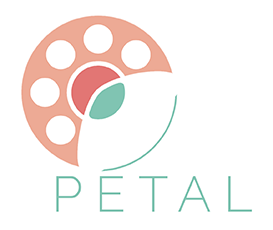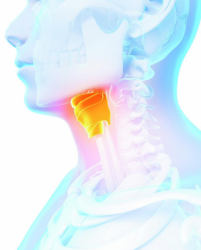

LARYNGECTOMY.NET
First step of phase I: exploratory analysis of needs
Analysis carried out with speech pathologists
Speech pathologists, as specialists in the re-education of voice and deglutition disorders, is the paramedical specialist most concerned by total laryngectomy, and is actually a privileged player in the treatment of laryngectomised patients.
He/she is present at the diagnosis announcement consultation, and his/her role is essential when the patient recovers his/her autonomy. Enabling the patient to speak, either with an oro-oesophageal or a trachoesophageal voice, attempts to compensate the main loss secondary to a total laryngectomy: the speech.
In this context, it would seem essential that speech pathologists be fully competent in the treatment of laryngectomised patients, and in the re-education of oro- and tracho-oesophageal voices, in order to improve the quality of life of laryngectomised patients. However, the dissertation by Ms Marion Grosdemange and Ms Margaux Malingrëy in 2010 revealed a net deficiency in the training of speech pathologists in this field.
The coordinator of the PETAL study therefore asked Ms Marie Isabelle Salaün, as part of her speech pathology dissertation, to evaluate the training needs of private practice speech pathologists and to create and distribute quality information for speech pathologists.
Hence, a questionnaire was given to 36 private practice speech pathologists, and an interview conducted with 6 speech pathologists: 3 private practice and 3 hospital therapists.
Among the answers to the questionnaires, nearly 50% of speech pathologists declare not having any treatment requests for laryngectomised patients. The others declared having 1 to 5 requests per year.
Among the speech pathologists who completed the questionnaire, half declared they had never re-educated a laryngectomised patient.
Among the speech pathologists who had re-educated laryngectomised patients, only half declared having performed both oro-oesophageal and tracheo-oesophageal speech re-education. However, 90% of them declared having difficulties with the treatment of laryngectomised patients.
The subjects for which the speech pathologists manifested the most interest were:
– Daily care
– Internet training support
– The surgery
– The network concept
– Re-education
Finally, the areas for which speech pathologists expressed an essential training and information need were the following:
– Anatomical changes and sequels of TL
– The mechanics of oroesophageal and tracheoesophageal voices
– Tracheal protections and daily care
– Information on the operation, hospitalisation, relationship with University hospital
– Equipment required for the re-education
Taking into account the results above, a set of information considered to be essential was created and formatted for speech pathologists.
First stage: assessment of education needs in:

